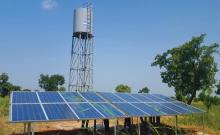Praia, 30/May/18 - The ECOWAS Centre for Renewable Energy and Energy Efficiency (ECREEE), has embarked on a project with the mission to promote electricity access through standalone solar systems for 19 countries in the ECOWAS and Sahel regions.
The current status of the energy system in the aforementioned regions, hampers the social, economic and industrial development. Countries in the broader West African region including the Sahel, face interrelated challenges of energy access, energy security and climate change mitigation simultaneously. Electricity shortages in urban areas and lack of access to modern, affordable and reliable energy services in rural areas are interrelated with a variety of economic, social, environmental and political problems.
The electricity systems in the region face challenges due to the growing gap between predicted demand, existing supply capacities and limited capital to invest. Although this region is only responsible for a fraction of global energy related Green House Gas (GHG) emissions, it will be highly impacted by mitigation and adaptation costs of climate change in the forthcoming decades. Thus, this trio of challenges, in turn, considerably complicates the implementation of regional strategies aimed at fostering socio-economic development, attracting foreign investment programs, providing basic social services, and achieving the Sustainable Development Goal (SDGs), specifically the SDG 7, to ensure access to affordable, reliable, sustainable and modern energy for all.
Taking this factors into consideration, ECREEE, supported financially by the World Bank Group and through Technical Assistance by the Lighting Africa Program, has been preparing to implement the Regional Off-Grid Electrification Project (ROGEP), with an overall estimated budget of USD 200 million, with the aim of contributing to reduction in energy poverty in the region. This project aims to provide energy services to the population not connected to the grid, through off-grid solar photovoltaic (PV) systems.
The off-grid solar equipment market is still quite new but rapidly evolving. New products are being developed with higher efficiency, more battery storage capacities, and increased reliability and longer product life. This reduces the payback period for customers. Solar PV equipment are reliable, sustainable and clean and given that the market is rapidly growing, they present not only viable investment opportunities, at the same time, potential improvements in the livelihood of the inhabitants of these regions.


